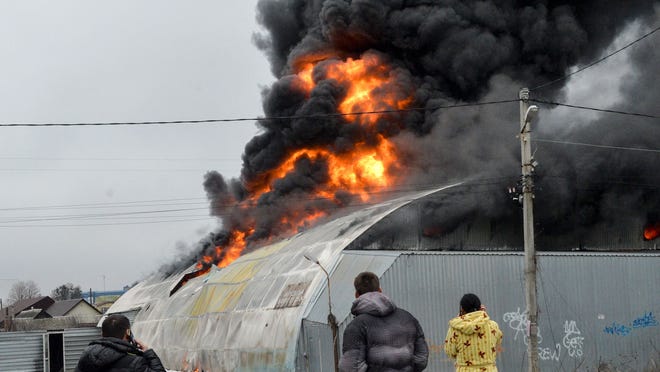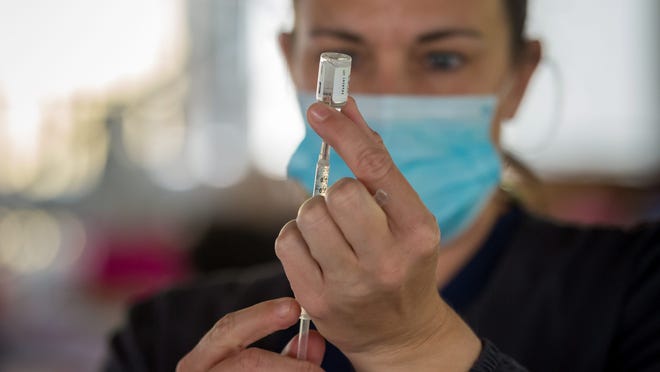
Fears of an unprecedented nuclear disaster spread rapidly overnight when part of Europe’s largest nuclear plant caught on fire in Ukraine as Russian forces shelled the area.
Amid a stream of confusing, alarming, and, at times, conflicting information about the incident, The International Atomic Energy Agency soon said the "serious situation" had not affected essential equipment at the Zaporizhzhia Nuclear Power Plant and that there had been no change in radiation levels.
That didn't stop Ukraine President Volodymyr Zelenskyy from giving an emotional plea to his nation and all of Europe in an overnight video address.
“If there is an explosion – that’s the end for everyone. The end for Europe. The evacuation of Europe,” Zelenskyy said. “Only urgent action by Europe can stop the Russian troops. Do not allow the death of Europe from a catastrophe at a nuclear power station."
RUSSIAN INVASION OF UKRAINE:Reports of shelling and fire at Zaporizhzhya Nuclear Power Plant in Ukraine
U.S. Energy Secretary Jennifer Granholm tweeted that the Zaporizhzhia plant’s reactors were protected by robust containment structures and were being safely shut down.
Still, descriptions from the scene painted troubling images.
Nuclear plant spokesman Andriy Tuz told Ukrainian television that shells were falling directly on the facility and had set fire to one of its six reactors. That reactor is under renovation and not operating, but there is nuclear fuel inside, he said.
Ukraine's Minister of Foreign Affairs of Ukraine tweeted "If it blows up, it will be 10 times larger than Chornobyl!"
But experts say the situation, while extremely dangerous, was unlikely to produce an apocalyptic explosion.
“While I don't think the plant would blow up, it would be close-in contamination to the local area like Fukushima was,” said Murray Jennex — a professor of crisis response at West Texas A&M University in Canyon, Texas and a former U.S. Navy nuclear power propulsion officer.
Jennex and other experts stressed that the primary danger to Zaporizhzhia was damaging the plant's cooling systems, which could lead to a meltdown.
IN THEIR OWN WORDS:Ukrainians talk about living through Russian invasion
While comparisons to Chernobyl nuclear disaster, which occurred about 300 miles away from the Zaporizhzhia Nuclear Power Plant, were understandable, the incidents are not easy to equate, according to James M. Acton, the co-director of the Nuclear Policy Program at the Carnegie Endowment for International Peace.
The Chernobyl disaster, while geographically close, was caused by a different process, Acton told USA TODAY. It was caused by operator error and led to a different level of danger — a situation where the nuclear fuel explodes.
At least 28 people were killed by the Chernobyl disaster, but thousands more have died from cancer as a result of radiation that spread after the explosion and fire. The effects of radiation on the environment and humans is still being studied.
Jon B. Wolfsthal, former senior director for arms control and nonproliferation at the National Security Council, tweeted that the Zaporizhzhia power plant was "inherently more safe and protected than the Chernobyl."
Acton echoed Jennex's assessment of the danger posed by the Russian attack, saying the fire could result in a "Fukushima-style meltdown."
In that nuclear incident in Japan, a massive earthquake and tsunami in 2011 destroyed the Fukushima plant’s cooling systems, triggering the meltdown of three reactors and the release of large amounts of radiation, and causing more than 160,000 people to evacuate.
GET THE LATEST UKRAINE UPDATES:We'll email you the latest news once a day.
Hours after the initial alarm was raised about the fire at Zaporizhzhya, Acton said that the worst seemed to be over.
"The immediate danger to Zaporizhzhya Nuclear Power Plant appears to have passed," he tweeted. "But tonight's events underscore the dangers facing all of Ukraine's nuclear power plants.
The danger from the overnight attack will linger in a variety of ways, according to Jennex and Acton.
Damage to the plant could cripple Ukraine’s power supply, Jennex said. The plant is also vulnerable to electricity or water cuts, which would also shut the plant down.
And both are concerned about the precedent of a wartime attack affecting a nuclear power plant — an act Acton described as a "illegal and horrific onslaught from Russia."
“Common sense says don't fight there, but Putin is not showing common sense," Jennex said.
"I'm not sure he cares.”
Contributing: Katie Vogel, USA TODAY; The Associated Press












